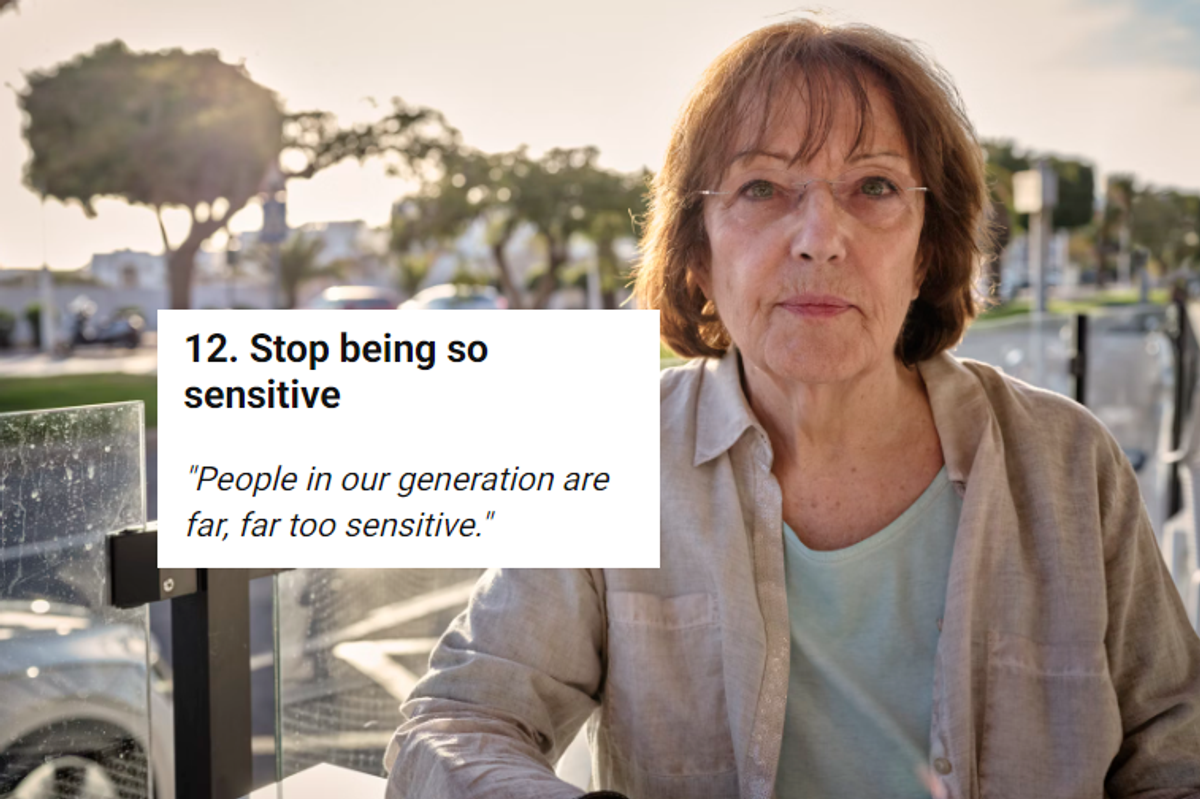Younger people are admitting baby boomers got these 17 things right
"Kids shouldn't be on phones or iPads all the time. It makes them weird."

Baby boomers didn't get everything wrong.
In recent years, baby boomers have often been the target of criticism from younger generations. The most common accusations are that boomers are selfish and don’t care about leaving ample resources (whether financial or environmental) to subsequent generations. They also come under fire for not being able to acknowledge that it was easier for people of their generation to come of age when things were more affordable and life was a lot less competitive.
However, we should also understand that many of today’s problems are not the boomers’ doing, especially when it comes to the issues that stem from entitled children and technology run amok. In hindsight, there’s something to be said about the importance boomers placed on self-reliance, letting kids be kids, and having a healthy skepticism towards technology.
In the end, each generation contributes to the tapestry of society in its unique way, whether good or bad, even baby boomers. This became evident after a Reddit user named Youssef4573 asked the AskReddit subforum: ‘What is something you can say ‘I'm with the boomers on this one’ about?” Over 4,700 people responded to the prompt, and the most prevalent problems mentioned by the younger generations were overreliance on technology, the modern world’s lack of human touch, and how Gen Xers and millennials have raised their children.
Here are 17 things that younger people are “with the boomers” about.
1. Public filming
"Just because I’m in public doesn’t mean I want to be filmed. Yeah, I know legally you can, but common courtesy people." — Jayne_of_Canton
2. Customer service
"I want to talk to a person in customer service, not a machine." — lumpy_space_queenie
"And also a person that actually works at the company I bought the product from, not a teenager at an outsourced call center with a script to follow and who answers calls for 15 different companies on the same day." — Loive.
3. Turn up the dialog
"For the love of all that is holy, can we fix the audio in movies so that the music and sound FX aren’t drowning out the dialogue?" — Caloso
"And the action sequences don’t burst your eardrums or the dialogue is whispers." — Whynottry-again
4. Bring back buttons
"No, I don't need everything in my car to be electronic. Some stuff needs buttons." — LamborghiniHEAT
"This was the big thing for me in my last car - trying to adjust volume or change songs while driving is way more dangerous when it’s all touch screen. Thankfully my current car has physical knobs for everything." — GeekdomCentral
5. App overload
"Every store/service does not need an app." — BigDigger324
"I was standing at a car rental counter at an airport (boomer here) to rent a car. My daughter’s car broke down on the way to pick me up. While standing at the counter, with a customer service rep right there and not busy, I had to log in to their site, create an account, and reserve a car. It seemed ridiculous and it took a long time, filling in my license information and all that. This was last September." — Cleanslate
6. Bring back DIY
"Learning DIY skills is crucial. I had basically zero DIY skills when I bought my house because I had lived in apartments for so long and I've had to learn a lot. YouTube tutorials are absolutely clutch." — JingleJongleBongle
7. Turn off the speakerphone
"I hated this when I worked at Walmart. So many of my coworkers would talk on speaker or watch TikTok at full volume. It's just trashy imo, nobody wants to hear your media." — WhiteGuy1x
"I work at an emergency medical office and holy sh*t the amount of people that sit in a quiet, peaceful lobby and just have the LOUDEST conversations on their phone…. Speaker or otherwise. Not to mention the people that still watch sh*t without headphones. Like do you not see the plethora of other people around you that you’re disturbing?" — Cinderpuppins
8. Ban QR code menus
"I think menus should be tangible." — Limp-Management9684
"QR codes kill the vibe. We’re all on our phones constantly throughout the day and then when you go to spend some quality time with someone, it’s another excuse to whip out the phone and stare at it. There’s an intimacy to a physical menu. You’re looking at what the other person is reading, you’re each pointing to parts of the menu. You’re noticing the lighting of the restaurant. QR codes feel chintzy and kill the ambiance completely." — VapeDerp420
9. Stop subscriptions
"When I was your age, you only had to pay for a video game once to own it." — CattonCruthby
10. Free the children
"A kid in 2024 should have the same freedom to exist unsupervised and move about their community independently as a boomer did growing up." — PixelatedFish
"The world is safer than it's ever been and people are more scared than ever. I blame true crime and local news." ⲻ Unhappyhippo142
11. Kids need to touch grass
"Kids shouldn't be on phones or iPads all the time. It makes them weird." — Ubstantial_Part_952
"The same could be said about most adults." — DrunkOctopus
12. Stop being so sensitive
"People in our generation are far, far too sensitive. Don't get it twisted; empathy is, by and large, a good thing and it takes some serious doing for me to say it's gone too far. But collectively, we've become people willing to throw every last bit of energy fighting against every slight and making sure our pet cause gets top billing to the point of fighting amongst each other even if we're in almost complete agreement otherwise. Emotional energy - like any other kind of energy - is very much a finite resource. Whereas boomers could at least generally agree to disagree and get on with things (obvious cross-wielding exceptions doth apply). Culturally, we've lost sight of the adage of 'winning the battle, losing the war.'" — almighty_smiley
13. Stop delivery
"Food delivery services are a complete ripoff; if you use them regularly, you’re terrible with money. Get off my lawn." — VapeDerp420
14. Parking meters
"So rather than throwing a few coins in your meter, you have to now get your license plate #, get your meter number, go to the meter station, stand in line with everyone waiting to pay their meter, then you're set. It's an unnecessary amount of extra steps. I don't carry cash much anymore, but I can hide a small amount of coin in my car to quickly pay a meter." — Luke5119
15. Kids should know their place
"Not letting your children rule the roost. When did it become acceptable to let your kids back-talk to you, slap you, climb all over shi*t in public places? As we've raised ours, I've witnessed so many parents around us just let these behaviors slide. It's kind of sad when I'm the one saying things like, "Did I just hear you just say that to your mom?!?!?!?! That is not ok. You go and apologize right now!!". Then I get this stunned "deer in headlights" look back that tells me they aren't used to someone calling them out on their behavior." — Cobblestone-Villain
16. Pride in ownership
"Seems that a lot of boomers have pride of ownership and enjoy maintaining what they have." — Awkward_Bench123
17. Don't follow leaders
"My dad (a solid boomer) has been saying that ALL politicians are crooks since he became disenchanted with politics around the Nixon era. He was starry-eyed before that, trying to make social change, yada yada. He still votes, but holds his nose. Can’t say I disagree with him." — Thin_white_duchess
This article originally appeared last year.
- 12 real stories that show why ruthless immigration laws are the ... ›
- Teacher admits there are 11 things that Boomer parents totally got right ›
- Folks are admitting that Boomers weren’t totally wrong. Here are 19 things they got right. ›
- Younger generations share their 'boomer' complaints - Upworthy ›
- Millennials share good things learned from boomer parents - Upworthy ›
- 'Boomer panic' is real problem caused by poor emotional regulation - Upworthy ›






 A woman takes a dark shower.
A woman takes a dark shower.